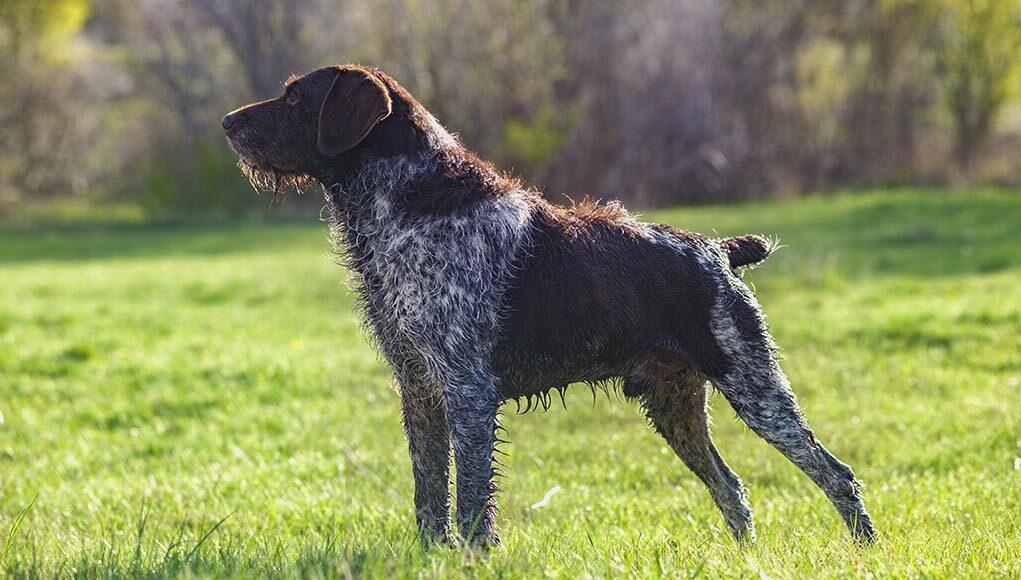Table of Contents
Do you enjoy hiking? Jogging? Or maybe long walks? We've got the perfect match for you. We present you—the German Wirehaired Pointer.
These dogs are affectionate and energetic gundogs that make versatile hunting companions or eager partners for dog sports.
German Wirehaired Pointers, also known as Wirehair or GWP, are medium to large-sized sporting dogs that originated in Germany.
They are enthusiastic and have an eager-to-please personality.
If you're planning to adopt a German Wirehaired Pointer puppy, you better scroll down! Below, we'll discuss everything about the breed—from its history to its grooming needs.
Now without further ado, let's kick things off with the GWP's history.
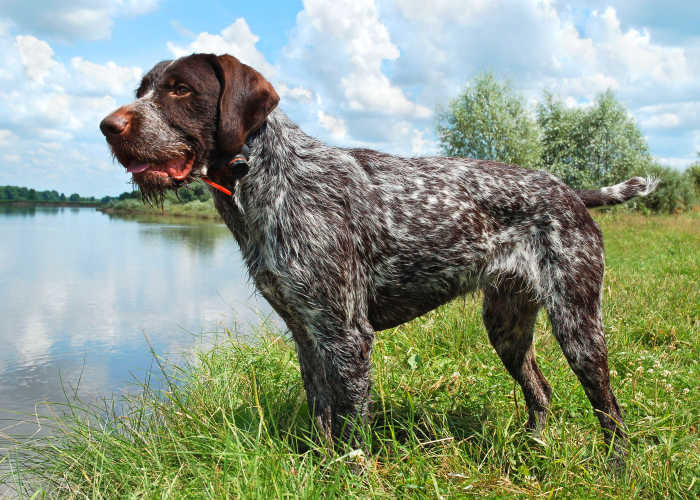
German Wirehaired Pointer History
In the late 1800s, dog breeders from Britain focused on creating hunting dogs—but not just any hunting dogs.
These dogs were specialized to work in certain types of conditions and environments.\
It doesn't matter if it's land or water. Germans wanted an all-purpose dog that could help them through any adversity.
The German Wirehaired Pointer or Drahthaar in his homeland of Germany descended from different breeds.
For instance, a dog known as Pudelpointer (an early combination of pointer-type dogs and poodles), wirehaired pointing griffon, and other breeds.
Some sources also believe that these dogs might have bloodhounds and foxhounds backgrounds.
In the 1920s, the German Wirehaired Pointer first stepped paws to North America, and in 1953, the German Drahthaar Club of America was formed.
The American Kennel Club first recognized the German Wirehaired Pointer breed.
Physical Traits of the German Wirehaired Pointer
The German Wirehaired Pointer's best features are a combination of the Foxhound, Pointer, and Poodle.
Thanks to their wiry coat that protects them from different kinds of weather or environment and their keen nose, these dogs can point and retrieve on land or in water.
German Wirehaired Pointers have a functional double coat that shields them from wet and cold environments as well as rough or rugged conditions.
Their wiry coat is one to two inches long, and their hair is straight and lies flat.
Their undercoat is barely visible in the summertime, but in winter, it becomes dense to give effective insulation against the cold weather.
They also have a facial beard that gives them a distinctive expression. Their beard and bushy eyebrows are not just for aesthetics because they protect their face and eyes from scratches and wounds.
GWPs coat can come in different patterns of liver and white such as spotted, liver roan, spotted with roan and ticking, or solid liver.
Some liver-colored head has a white blaze, but the ears are colored liver.
Male Wirehairs' height stands about 24 to 26 inches at the shoulder. Females, on the other hand, are a bit smaller but not under 22 inches.
GWPs' average weight is between 60 to 70 pounds.
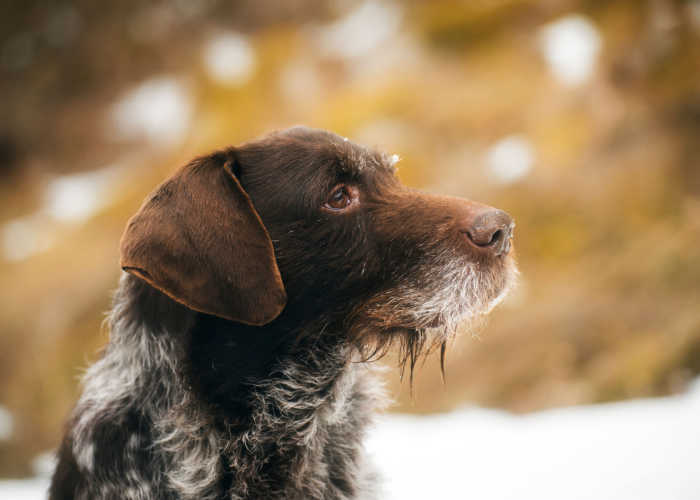
The Temperament of a German Wirehaired Pointer
German Wirehaired Pointers are loving and loyal to their family. They are friendly and joyful to the people they know but can be distant from strangers.
They are more than just hunting dogs. These dogs are affectionate and make excellent companions.
With proper and plenty of physical and mental exercise, they can be a great addition to the family.
GPWs can also make good watchdogs. They will bark at strangers trying to approach his property.
They are a bit possessive of his things, such as toys and blankets, and also his people. A German Wirehaired Pointer will defend his family if they're in danger.
Living with a GWP
GWP is a great companion for older children since they'll be able to match up to their size and energy. As pet parents, we must supervise all of their interactions for their safety.
This is to avoid any biting, ear-pulling, or any other exchange that can hurt both children and the dog.
These dogs will get along better with children if they are raised with them.
But an adult GWP who's been adopted by a family with children can learn to happily live with them with proper introduction and supervision.
German Wirehaired Pointers are lively dogs, so keep in mind that some may try to dominate other pets at home.
Also, since these dogs are full of energy, they are not suitable for apartment living. They are best fit in houses with spacious yards or in the countryside, where they have plenty of fenced-in lands to run around and play.
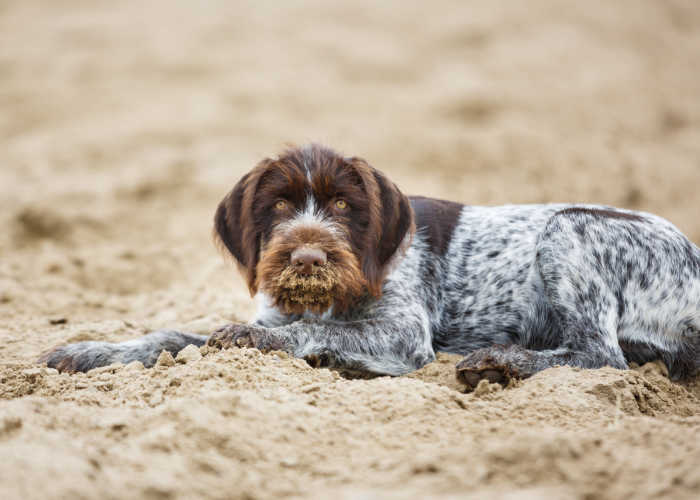
Training and Exercise
As we've discussed above, the German Wirehaired Pointer is active and eager to learn. That means they'll need plenty of physical and mental stimulation.
GWPs are powerful and energetic dogs. Daily vigorous exercise is recommended. Lack of exercise can lead to restlessness and destructive behaviors.
You try to exercise your dog for at least two hours per day. You can take Fido on long walks, running or jogging, hiking, swimming, or other vigorous playtimes.
This can not just maintain their health, but it can also be a way to strengthen your bond with the dog.
When it comes to exercising your GWP, ensure that they are on a leash or in a secured fenced-in area.
These dogs have a high prey drive that they can run off chasing small animals such as squirrels, rodents, or birds.
When it comes to training, it's best to use positive reinforcement or reward-based training as these dogs respond well to these kinds of methods.
Just like any dog breed, it's best to start training and socialization from an early age. This is to help instill good manners and prevent bad habits in the future.
One challenging thing in training that you might encounter is training them to be alone. German Wirehaired Pointers love to be around their people as much as possible.
Separation anxiety can be an issue with the GWP. Symptoms of this condition are excessive chewing, digging, pacing, excessive barking or howling, and other destructive behaviors.
But the German Wirehaired Pointers are best fitted for families where someone is home for most of the day.
Health Care
Generally, the German Wirehaired Pointer is a healthy dog breed. But just like any other dog breed, they are prone to certain health problems.
This doesn't mean that your Wirehair will get any of these illnesses. However, as pet owners, we need to be aware of them.
If you're trying to adopt a German Wirehaired Pointer puppy, find a reputable breeder. Responsible breeders can give you health clearances for the puppy and its parents.
Below, we've gathered a few health problems that GWPs are prone to.
Cataracts
Cataracts are an eye problem GWPs are prone to. It is the gradual clouding of the lens in the eyes. It can impair their eyesight and even cause blindness in extreme cases.
Although this is more common in elderly dogs, it can also be acquired through genetics, traumatic injuries in the eyes, nutritional deficiencies, or diabetes.
Have your pet get an ophthalmic examination to detect small cataracts as early as they step four to five years old.
To determine whether it is blinding or not, it is better to check with your veterinarian to be informed what procedure should be done.
Entropion
Entropion is the condition where the eyelid rolls inward, creating friction in the sensitive part of the cornea.
Usually, this condition requires surgery when it is quite damaging and may progress quicker than expected.
If German Wirehaired Pointers are suspected of having Entropion, owners should bring their pet to the veterinarian for further examination.
Von Willebrand’s Disease
Von Willebrand's Disease is a bleeding disorder in dogs and humans that is caused by a lack of protein in the blood.
The lack of protein disables clotting when open wounds and may result in blood loss.
Some symptoms may be sustained bleeding after surgery or trauma. Another is hemorrhage from various body parts, including the nose, oral mucous membrane, urinary bladder, and vagina.
Owners should check with their veterinarians for tests and further consulting regarding precautionary measures they have to take with GWPs who have the disease.
If the disease has taken place and is not addressed immediately, it may become fatal for the dog.
Hip Dysplasia
Hip Dysplasia is a genetic condition wherein the socket of the joint and ball becomes distorted.
When diagnosed with elbow and or hip dysplasia, it’s important to keep their weight in the normal range and have them exercise with activities that promote joint therapy.
GWPs have naturally denser and thicker bones and muscles.
If their weight is over the standard, they may develop problems in the bone and joint as it is the most strained during activities.
Veterinarians may prescribe medications for anti-inflammatory/pain relievers and supplements. Prevention is the same, keeping them active but not injuring them as well.
A treadmill walk or swimming are great exercises to help prevent this kind of health issue.
Hypothyroidism
Hypothyroidism is the static function of the thyroid gland. Metabolism is slowed down if diagnosed.
In hypothyroidism, the immune system attacks the thyroid gland as it does not acknowledge it. It is also usually a genetic disorder.
For German Wirehaired Pointers who are experiencing lethargy, slow heart rate, weight gain, excessive shedding, and high cholesterol, it’s best to have them tested by the veterinarian.
The veterinarian may provide maintenance and recommended diet. It’s best to have this condition checked and addressed immediately.
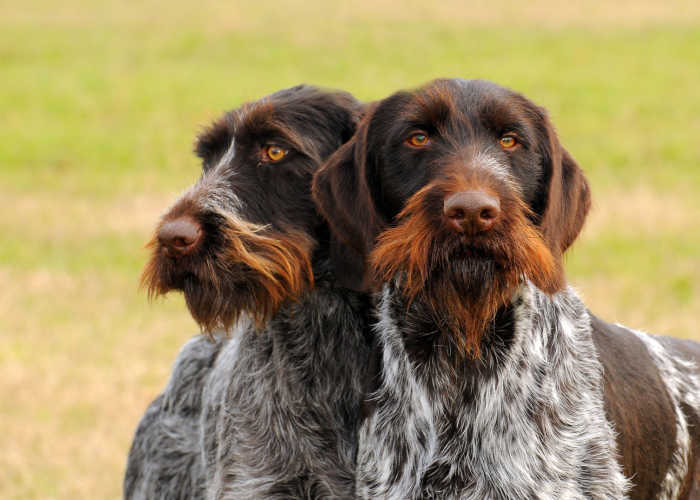
Grooming
The German Wirehaired Pointer has a dense, wiry coat that requires minimal grooming.
But keep in mind that regular brushing is still required to maintain their cleanliness. Brush their coat weekly to remove loose fur and prevent tangles.
Brushing requirements will increase once their shedding season comes. It is usually in warm weather you'll have to brush more frequently.
Other GWPS are born with a long, soft, silky, or woolly coat. These kinds of coats will take more time and effort to care for than GWPs with wire coats.
When it comes to bathing, you should bathe your dog once or twice a month. But this depends on how dirty they get when they play.
It's also important to check their ears weekly for wax buildup, dirt, or irritation. Also, check for redness or bad odor since it can indicate an infection.
You should ensure that their ears are dry after a bath or swimming.
Nail trimming is also essential for dogs. It's best advised to not allow their nails to touch the ground.
If you hear those clicky sounds while they are walking, that means they need nail trimming.
When you groom your German Wirehair, you should check for sores, rashes, or any signs of infection like redness, tenderness, or inflammation.
Frequently Asked Questions about the German Wirehaired Pointer
Are German Wirehaired Pointers good with cats?
German Wirehaired Pointers were originally bred to hunt. These dogs have a strong prey drive that doesn't fit well with other pets (especially small animals).
This includes small dogs, cats, rabbits, hamsters, and more.
However, early socialization can help them accept cats and dogs as part of the family. It will be more helpful if the cat and the GWP grew up together.
Is a German Wirehaired Pointer a good family dog?
German Wirehaired Pointers are considered even-tempered dogs.
They are affectionate and very loyal to their family. They do well with children as long as they are properly introduced.
It is best advised to start socialization and training at an early age. They do well with children, especially if they grew up together.
Are German Wirehaired Pointers good for first-time owners?
German Wirehaired Pointer is not an ideal pet for first-time owners. These dogs require significant amounts of training, exercise, and attention.
If you spend your time at work most of the day, this dog is not suitable for you. This dog loves to be with his owners almost all the time.
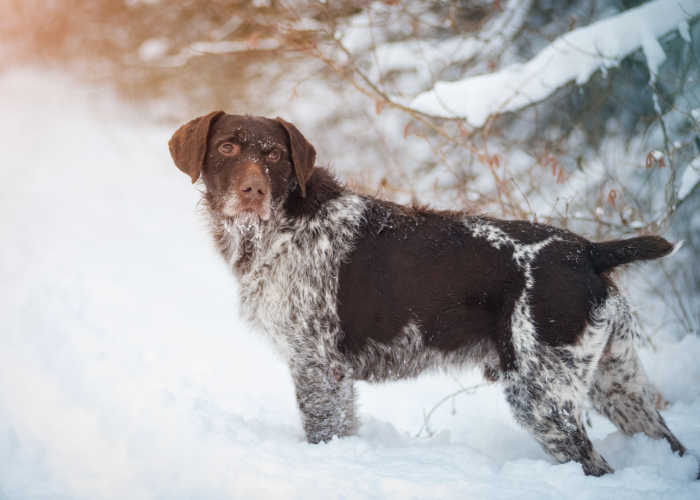
German Wirehaired Pointers Dog Breed Profile: Summary
The German Wirehaired Pointers are energetic sporting dogs who love outdoor activities with their family.
If you're the type of person who loves the outdoors, fond of jogging or hiking, the GWP is the perfect companion for you.
The German Wirehaired Pointer, or Deutsch Drahthaar in German, is not just any hunting dog. These dogs were specifically bred to work in different kinds of environments.
The GWP can work through land or water. No matter what the weather is, whether it is sunny or cold, GWP is on the case.
This dog breed is not only a hard worker but also a sweet lover. They are very affectionate to his family, making them great family dogs.
These dogs also make good watchdogs as they are territorial, and they'll bark at strangers trying to go near his property.
They are friendly to people that he knows but can be a bit distant to strangers.
And even though they love to cuddle, the GWP is a tough dog breed who'll protect his family no matter what.
If you're looking to adopt a German Wirehaired Pointer puppy, keep in mind that these dogs are a lot of work. It is not recommended for first-time owners and for people who live in small homes.
They require lots of time for exercise, training, and bonding. Do all this properly, and you'll have yourself one of the best and most loyal dogs.


